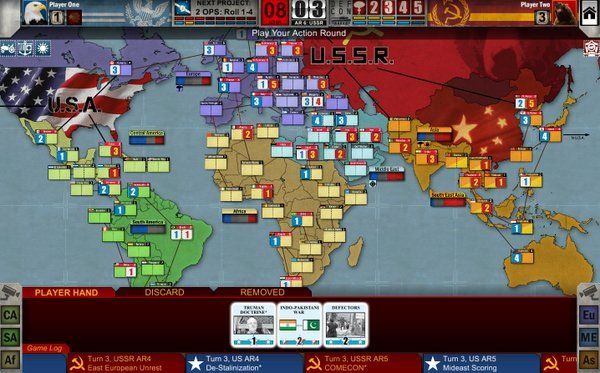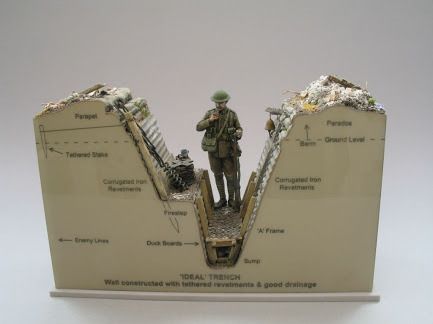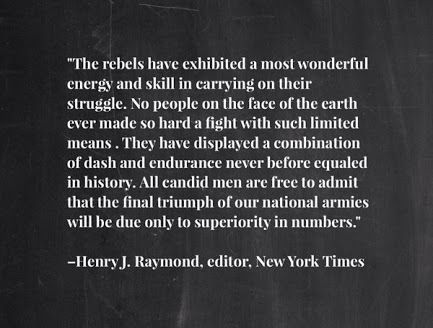WARGAME WEDNESDAY: Twilght Struggle on Steam, Harold Buchanan on Low Player Count, and Fire in the Lake in the Classroom!
Wednesday , 20, April 2016 Wargames Leave a comment The internet has been positively on fire with great material on wargaming the past couple of weeks here. Check it out:
The internet has been positively on fire with great material on wargaming the past couple of weeks here. Check it out:
- GMT Games now has Twilight Struggle up on Steam. This is the war game that very nearly burned down Board Game Geek– and it’s now available on the PC or Mac! If you want to check out a beloved game that has crossed over into a surprising range of players, this is it! PCGamer is positively lavish with its praise: “Twilight Struggle’s creativity and elegance sets it apart from most of what’s available on PC. It’s a great strategy game, but one that behaves according to completely different logic than we’re used to seeing. As a strategy game, Twilight Struggle is a revelation. On PC, it’s one of the best head-to-head strategy games around.” Ludobits has an in depth breakdown on the user interface here.
- The Low Player Count interview with Harold Buchanan is fantastic. Find out the complete story on how it came together. Find out how Mark Herman, Joseph Miranda, and Mark Miklos influenced the design. Find out how a novice creator could come out of nowhere, get something on the table, and then do that last one percent of the design process to make a game that a lot of people are talking about.
- This informative animation about The Battle of Jutland is something you won’t want to miss given that the 100th anniversary of this engagement is on the way. (Thanks to consimworld for the tip.)
- Meanwhile, someone that is clearly Teacher of the Year material is teaching about the Vietnam War with Mark Herman and Volko Ruhnke’s Fire in the Lake. Check out the students’ reactions both before and after the game!
These bullet points are just the tip of the iceberg, however. This YouTube video presenting the first episode of a series that will compare what we know from history to five different wargame implementations of the same battle. First up? SPI’s Phalanx! Can 1971 technology handle Alexander’s clash with Darius? Watch the whole thing!
And check out these fantastic game blog posts:
 Analysis (Wargame_[space]) My kingdom for a phalanx — “Boardgames, and especially wargames, don’t lend themselves to easy analysis, almost entirely for the reason that in order to have any intelligent comments to make, you really have to play them. Which isn’t any different from a video game. But unless the game is specifically designed as a solitaire game, I feel you really have to play them against someone else. That takes a lot more time than just sitting down at the computer and playing 60 consecutive hours of Bloodborne. This disrupts the traditional flow of game information because as quickly as we move on from one game to the next, really sitting down to play and appreciate a game takes longer than the particular window of attention a game might be afforded by the public before it moves on to something else. So you’re stuck making videos in the short time those videos are relevant to much of your intended audience. And that leaves you with just about enough time to describe how the game works, and whether you like the idea of how it works. Balance? Please.”
Analysis (Wargame_[space]) My kingdom for a phalanx — “Boardgames, and especially wargames, don’t lend themselves to easy analysis, almost entirely for the reason that in order to have any intelligent comments to make, you really have to play them. Which isn’t any different from a video game. But unless the game is specifically designed as a solitaire game, I feel you really have to play them against someone else. That takes a lot more time than just sitting down at the computer and playing 60 consecutive hours of Bloodborne. This disrupts the traditional flow of game information because as quickly as we move on from one game to the next, really sitting down to play and appreciate a game takes longer than the particular window of attention a game might be afforded by the public before it moves on to something else. So you’re stuck making videos in the short time those videos are relevant to much of your intended audience. And that leaves you with just about enough time to describe how the game works, and whether you like the idea of how it works. Balance? Please.”
PC Games (Quarter to Three) Tigers on the Hunt gets its TEM in its DEF and that’s AOK — “Computer wargames feel like they’re stuck in some sort of sad entertainment backwater. While other genres experience evolution and expansion, computer wargamers are like those passengers on that ship in the Twilight Zone doomed to be sunk by the same German U-boat every night until the end of time: they have this vague feeling something is going to happen at a certain time, but they aren’t sure what. Uncomfortable premonitions? We’ve all had them. And then someone releases Combat Mission: Shock Force, and we’re on our way to the sea bottom, once again.”
Game Design (League of Game Makers) Making Volatility Work For Your Game Part 2 — “The beautiful thing about poker is that the volatility of the game stays the same even with more players; in fact, the player’s perception is that the volatility increases with more players. This is because each player adds their initial buy-in to the pool of possible winnings and the pot mechanism leads to temporary player elimination allowing one person to win a large amount on one turn.”
 Education (War on the Rocks) Wargaming in the Classroom: An Odyssy — “As a capstone event I added a wargame. I selected Fran Diaz’s Polis: Fight for the Hegemony, because, unlike many games, it has a heavy economic and diplomatic element. After dividing the seminars into teams, I was able to run five simultaneous games. The results were amazing. As every team plotted their strategic ‘ends,’ students soon realized that neither side had the resources — ‘means’ — to do everything they wanted. Strategic decisions quickly became a matter of tradeoffs, as the competitors struggled to find the ‘ways’ to secure sufficient “means” to achieve their objectives (‘ends’). For the first time, students were able to examine the strategic options of the Peloponnesian War within the strictures that limited the actual participants in that struggle.”
Education (War on the Rocks) Wargaming in the Classroom: An Odyssy — “As a capstone event I added a wargame. I selected Fran Diaz’s Polis: Fight for the Hegemony, because, unlike many games, it has a heavy economic and diplomatic element. After dividing the seminars into teams, I was able to run five simultaneous games. The results were amazing. As every team plotted their strategic ‘ends,’ students soon realized that neither side had the resources — ‘means’ — to do everything they wanted. Strategic decisions quickly became a matter of tradeoffs, as the competitors struggled to find the ‘ways’ to secure sufficient “means” to achieve their objectives (‘ends’). For the first time, students were able to examine the strategic options of the Peloponnesian War within the strictures that limited the actual participants in that struggle.”
COIN (Defense Linguistics) Through a Glass, Darkly — “Of Brian’s designs with which I’m familiar all attempt a similar level of honesty. They are deeply skeptical of ideology and other power fantasies. Their mechanisms give you plenty of rope with which to hang yourself. Glorious blitzkriegs, chevauchées, razzias, and shit-hammerings are rare and never engaged without careful calculation of the downsides. If he had designed OGRE, there would be the possibility of co-opting the cybertank by surrendering power stations along with a good wash and detail. I still say his Algeria is way too hard on the French, although I’ve been able to win playing both sides.”
—
PaxSims (Simulations)
- Participants sought for WWII gameplay study (4/20/16)
- Lacey on wargaming in the classroom (4/19/16)
- Connections 2016 wargaming conference (4/16/16)
- Simulation and gaming miscellany, 13 April 2016 (4/13/16)
- CNAS crisis-games Baltic security (4/11/16)
- The return of wargaming? (4/11/16)
- Harassment in gaming (4/08/16)
- CAFOD’s FLOOD! game (4/08/16)
- Simulation & Gaming, April 2016 (4/08/16)
—
Inside GMT (GMT Games)
- WWII in Two (and a half) Hours and then 58 Minutes: Hitler’s Reich AAR’s with a New Player (Part 2) (4/19/16)
- Into the Wild Blue Yonder: Campaign Rules, Part 1 (4/17/16)
- Delian League Diaries #2 (4/14/16)
- Talon Tuesday Issue #27: Talon Puzzle 3 – Solution (4/12/16)
- WWII in Two (and a half) Hours and then 58 Minutes: Hitler’s Reich AAR’s with a New Player (Part 1) (4/07/16)
—
Castalia House (Wargames)
- Elements of Wargaming: Rolls and Roles (4/20/16)
- GTD’s The Napoleonic Wars: Napoleon’s Italian Campaigns (4/13/16)
—
- Hedge Killing, Foxholes from Hell and Pistols Against Armor – A Combat Mission Final Blitzkrieg Short Movie (4/11/16)
- Graviteam Tactics Mius Front – Video (4/07/16)
—
Ludic Futurism (Brian Train)
- Thoughts on Kandahar (4/20/16)
—
VASSAL (News)
- New Module – Babel (4/19/16)
- New Module – Order and Chaos (4/13/16)
- VASSAL is one of SourceForge’s projects of the week (4/13/16)
—
War in a Box (Warren Abox)
- On Hiatus (4/11/16)
- The Pool Room (4/09/16)
- Temporary Storage Solution (4/07/16)
Please give us your valuable comment